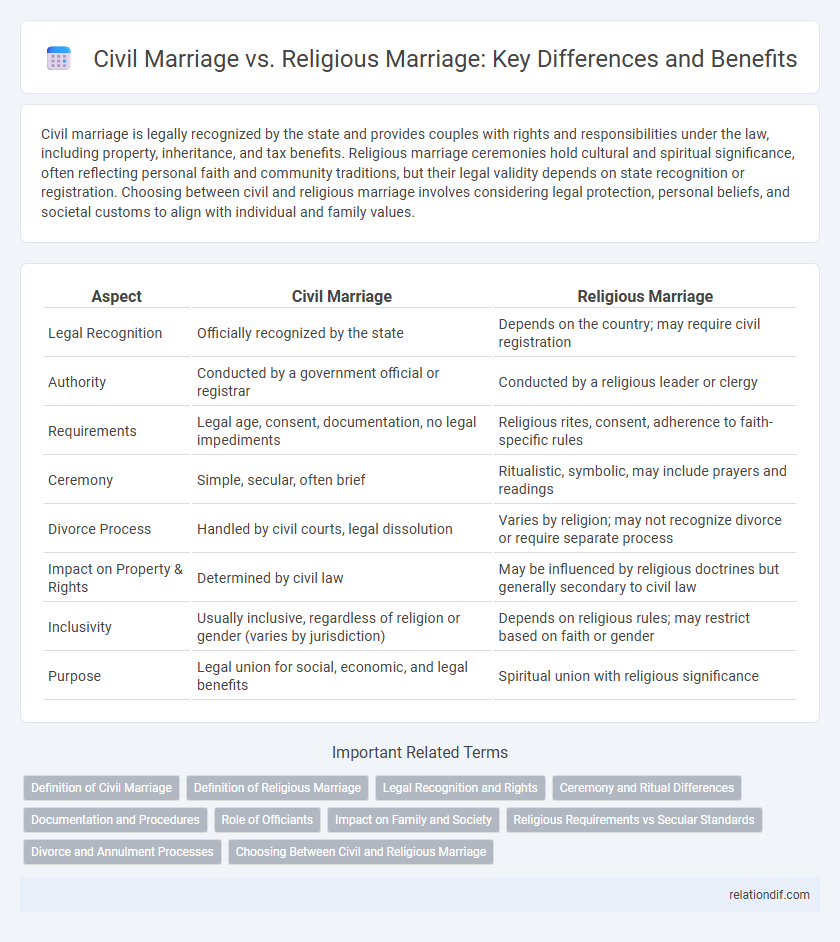Civil marriage is legally recognized by the state and provides couples with rights and responsibilities under the law, including property, inheritance, and tax benefits. Religious marriage ceremonies hold cultural and spiritual significance, often reflecting personal faith and community traditions, but their legal validity depends on state recognition or registration. Choosing between civil and religious marriage involves considering legal protection, personal beliefs, and societal customs to align with individual and family values.
Table of Comparison
| Aspect | Civil Marriage | Religious Marriage |
|---|---|---|
| Legal Recognition | Officially recognized by the state | Depends on the country; may require civil registration |
| Authority | Conducted by a government official or registrar | Conducted by a religious leader or clergy |
| Requirements | Legal age, consent, documentation, no legal impediments | Religious rites, consent, adherence to faith-specific rules |
| Ceremony | Simple, secular, often brief | Ritualistic, symbolic, may include prayers and readings |
| Divorce Process | Handled by civil courts, legal dissolution | Varies by religion; may not recognize divorce or require separate process |
| Impact on Property & Rights | Determined by civil law | May be influenced by religious doctrines but generally secondary to civil law |
| Inclusivity | Usually inclusive, regardless of religion or gender (varies by jurisdiction) | Depends on religious rules; may restrict based on faith or gender |
| Purpose | Legal union for social, economic, and legal benefits | Spiritual union with religious significance |
Definition of Civil Marriage
Civil marriage is a legally recognized union between two individuals, established and regulated by government authorities rather than religious institutions. It grants couples specific legal rights and responsibilities, including property ownership, tax benefits, and inheritance rights. Unlike religious marriage, civil marriage is secular and inclusive, allowing people of different faiths or no faith to legally marry.
Definition of Religious Marriage
Religious marriage is a legally recognized union conducted according to specific religious doctrines and rituals, often solemnized by a clergy member or religious authority. It emphasizes spiritual commitment and moral values based on faith traditions, and its validity may depend on the rules of the respective religion. This type of marriage frequently involves ceremonies that reflect cultural heritage and religious beliefs, distinguishing it from civil marriage, which is primarily a legal contract governed by state laws.
Legal Recognition and Rights
Civil marriage grants couples full legal recognition and access to rights such as inheritance, taxation benefits, and healthcare decisions, enforced by the state. Religious marriage, while significant culturally and spiritually, may lack automatic legal standing unless registered with governmental authorities. Legal recognition of civil marriage ensures protection under family law, including divorce proceedings and child custody arrangements.
Ceremony and Ritual Differences
Civil marriage ceremonies typically emphasize legal formalities and are conducted by authorized officials in neutral settings such as courthouses, featuring minimalist rituals centered on vows and signatures. Religious marriage ceremonies often include elaborate rituals rooted in faith traditions, such as readings from sacred texts, prayers, and symbolic acts like lighting candles or exchanging rings within a place of worship. These ethical and cultural rituals highlight the spiritual significance of marriage, contrasting with the secular, legal focus of civil ceremonies.
Documentation and Procedures
Civil marriage requires official documentation such as a marriage license, identification cards, and sometimes proof of residency, with the process conducted at a government office or registry. Religious marriage often involves submitting documents to a religious authority and may require prior counseling or ceremonies according to specific faith traditions. The legal recognition of a civil marriage is immediate upon registration, whereas religious marriages may need civil registration for legal validity.
Role of Officiants
Civil marriage officiants are authorized government officials or judges who legally validate the union according to state laws, ensuring compliance with legal requirements and documentation. Religious marriage officiants, such as priests, rabbis, or imams, perform ceremonies rooted in specific faith traditions but may also have legal authority depending on jurisdiction. The distinct roles highlight the separation between legal recognition and spiritual significance in the marriage process.
Impact on Family and Society
Civil marriage provides legal recognition and equal rights to all couples, promoting social inclusion and protecting family welfare through enforceable rights like inheritance and child custody. Religious marriage often reinforces cultural values and community cohesion, influencing family traditions and social norms that shape interpersonal relationships and community support systems. Both forms impact societal stability by defining family structures and legal responsibilities, with civil marriage emphasizing legal equality and religious marriage emphasizing moral and spiritual commitments.
Religious Requirements vs Secular Standards
Religious marriage requires adherence to specific rites and doctrines defined by the faith, such as vows administered by clergy and rituals symbolizing spiritual union. Civil marriage follows secular standards regulated by government laws, focusing on legal rights, responsibilities, and registration without spiritual elements. This contrast highlights how religious requirements emphasize faith-based legitimacy, whereas civil marriage ensures legal recognition and protection for partners under the state.
Divorce and Annulment Processes
Civil marriage provides a legal framework that simplifies divorce through standardized court procedures, often resulting in quicker resolutions compared to religious marriage. Religious marriage typically involves annulment processes governed by specific faith-based criteria, which can be more complex and lengthier due to doctrinal requirements. Divorce in civil marriage terminates the legal bond recognized by the state, whereas annulment in religious contexts declares the marriage null from the beginning, impacting marital status differently.
Choosing Between Civil and Religious Marriage
Choosing between civil and religious marriage depends on legal recognition, personal beliefs, and cultural traditions. Civil marriage offers state-sanctioned rights such as taxation benefits, inheritance, and spousal support without religious affiliation, while religious marriage emphasizes spiritual commitment based on faith-based ceremonies. Couples must consider legal implications, family expectations, and personal convictions to determine which form best aligns with their values and life goals.
civil marriage vs religious marriage Infographic

 relationdif.com
relationdif.com